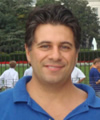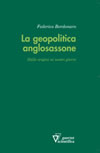Introducing Federico Bordonaro
 Federico Bordonaro (1972) currently works as a political and geopolitical analyst. Furthermore, he has worked as a lecturer in geopolitics and political history. Dr Bordonaro obtained a PhD in modern and current history at Paris La Sorbonne University, discussing a thesis on the European Security and Defence Policy. He also has a Master’s degree in Diplomacy. He is author of a book on Anglo-Saxon geopolitical thought (“La geopolitica anglosassone”, Milan, 2009) and co-editor of a book on European security (“La potenza incompiuta”, Rome, 2005).
Federico Bordonaro (1972) currently works as a political and geopolitical analyst. Furthermore, he has worked as a lecturer in geopolitics and political history. Dr Bordonaro obtained a PhD in modern and current history at Paris La Sorbonne University, discussing a thesis on the European Security and Defence Policy. He also has a Master’s degree in Diplomacy. He is author of a book on Anglo-Saxon geopolitical thought (“La geopolitica anglosassone”, Milan, 2009) and co-editor of a book on European security (“La potenza incompiuta”, Rome, 2005).
Geopolitical Passport
Your relationship with geopolitics
At what age did you discover geopolitics and what attracted you to it?
I discovered geopolitics at the age of 21. What attracted me most was the analysis of the interplay between geographical ‘structural’ settings and the character of States, in particular their foreign policy.
I was studying history and political science and I consistently searched for theories and methods to investigate what Pierre Renouvin, the French historian, called “the deep forces of history”. At that time I was in love with the French school of “Les Annales” and I discovered the works of masters such as Lucien Fèbvre and Fernand Braudel, who long studied the influence of geography on history.
I avidly read articles and books by the Italian general Carlo Jean and by Yves Lacoste, the great French geographer. I was attracted by the dynamic representation of geopolitical conditions in maps.
Which geopolitical topics have your focus and why did you choose especially these?
From a theoretical standpoint, my focus is on modern geopolitical theory, especially the works of Randall Collins, David Waller, Jieli Li, and Daniel Deudney, and on the geopolitical-historical analysis offered by Jakub Grygiel.
I am fascinated by the attempts to build a macro-level theory that helps us to explain why some States are powerful and others are weak, and what dynamics change their fate. I generally like to explore the links between geopolitics, historical sociology, and long-run history.
I definitely like historians like Braudel, William McNeill, or Paul Kennedy, who have explored the interaction between social, economic, cultural, and political-military variables in the long run. I also like a lot the new French school of geopolitics.
Especially the works of François Thual have my attention, as he has built a very useful method of geopolitical analysis that combine State-centric ‘realism’, geographical insight, and critical geopolitics (chiefly, the study of the symbolical value of territory, of geopolitical representations and their relations with nationalism or other ideologies).
Personally I believe that the French school of geopolitics is on the right track when it calls for an in-depth study of political demography (like Gérard F. Dumont or Gérard Dussouy do). I also consider the study of the famous ‘demographic-structural theory’ developed by Jack Goldstone to be mandatory for all geopolitical scholars.
The human factor within geography and politics has been overlooked in the past, some exceptions notwithstanding, but has tremendous explanatory power (see, for instance, the current unrest in north African countries).
As far as current geopolitical issues are concerned, I focus mainly on Europe and its ‘near abroad’, like the Mediterranean region and the macro-area that Saul B. Cohen has called the ‘Eurasian convergence zone’, i.e., the vast area that goes from the Baltic Sea to Central Asia across the Black Sea-Caspian region. Territorial, demographic, and energy-related issues in this region are complex and challenging, and a sound geopolitical analysis can help us to put them in perspective, as well as to understand the lessons of long-run history.
What do you consider your most important contribution to geopolitics?
I think that my book on classical and post-classical Anglo-American geopolitical thought is a useful contribution to the study of geopolitics in Italy, especially because many important authors are known only superficially (mostly through commentaries). A logical next step would be to explain the links between different theories, and how to use such links. But this is another story, for another book!
Your geopolitical preferences
What is your favourite definition of geopolitics?
“The study of the spatial dynamics of power and conflict”. It is simple, but at the same time captures the essence of our discipline well: the study of interactions between physical as well as human geography and politics, and the analysis of the implications of such interactions, like their impact on the prestige of policy makers or geopolitical representations.
Which geopolitical scientist do you admire the most
Randall Collins, the US sociologist who built a synthetic model of the territorial power of States. He has modernized the Mackinder-Spykman school of thought by combining it with a Weber-inspired conflict theory, thus creating the link between conflict sociology and geopolitical analysis.
What is your favourite geopolitical book?
“Democratic Ideals and Reality” by Halford Mackinder (1919), a fascinating book that perfectly explains the goals of classical geopolitics: the search for links between geographical and historical generalizations.
What is your favourite geopolitical website?
ExploringGeopolitics is my favourite. Not because it interviews me 😉 … but because it’s the only specialised website that gives a voice to different schools of geopolitical thought.
The geopolitical future
In what direction(s) will geopolitical science be heading the coming decades?
Some scholars will increasingly focus on the ‘psychology of power’, geopolitical representations and the deconstruction of geopolitical traditions. Others will take a more ‘positivist’ route, trying to build theoretical models to explain political change.
However, not many political scientists believe that a ‘geopolitical science’ can exist. I believe, personally, that a geopolitical theory is possible, but as with all human sciences, it faces enormous challenges, chiefly because its ‘laboratory’ is history.
I encourage readers to read Jieli Li’s book “Why Do States Fragment and Break Apart?: An Historical Sociology of Eight Cases”. It is an excellent example of positivist, theory-based geopolitical analysis.
Which geopolitical subject has been too little in the spotlight and needs further research?
I am convinced that the interaction between geopolitics (understood as the territorial power of states and its consequences for conflict) and international political economy urgently needs research.
In other words, how does the territorial power of States impact on political competition for world markets?
Also, I think that the impact of demographic changes on geopolitics needs further research and more sophisticated models, although it has been explored many times.
What will be the largest geopolitical challenge for the world in the 21st century?
There will be many. But the largest one will be the oldest one: how to manage the quest for power by competing political units, as they vie for the control of strategic territories, resources, and communication routes.


Excellent article.